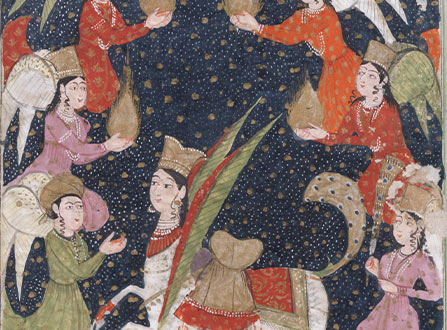Israʾ and Miʿraj: The Night Journey and Ascension
The opening verse of the seventeenth chapter of the Quran praises God who “carried His servant by night from the Holy Mosque to the Further Mosque” to “show him some of Our signs.” From this brief reference, early commentators spun a tale of profound cosmological and spiritual significance: on the night of the 27th of the month of Rajab, in 621 CE, the Prophet Muhammad miraculously traveled on the winged horse Burāq from Mecca to the site where the Jewish Temple had once stood in Jerusalem, the “farthest mosque” of the verse. From there, the Prophet Muhammadascended through the seven heavens to stand before God himself. This journey took place not just in a single night, but, some commentators say, entirely outside of time, in a single instant.
While this is the most explicit Quranic reference to the revelations, some authorities also see the “Lote-Tree of the boundary” which is “the Garden of the Refuge” (53:14-15) and the appearance of “a noble messenger” before “the Lord of the Throne” (81:19-25) as allusions to the Prophet’s heavenly experiences.
Jerusalem’s importance as the third holiest city in Islam is closely linked to this account, and, in fact, for several years after the event the early Muslim community prayed in the direction of Jerusalem. More broadly, the Prophet Muhammad’s heavenly encounters with the prophets who preceded him, including Moses, Jesus, David, Solomon, Enoch, and Abraham, exemplifies the ties that bind Islam to the Jewish and Christian traditions.
The story of the Prophet Muhammad’s night journey (Isra’) and ascension (Mi῾raj) is retold in detail in the hadith collections of the sayings of the Prophet. These and later expansions and versions of the story highlight the event as a turning point in the Prophet Muhammad’s life and, especially for Sufi mystics, as a model for the spiritual path to enlightenment. The Mi῾raj has played a pivotal role especially in the Persian mystical and poetic tradition. The philosopher Ibn Sīnā (Avicenna, c. 980-1037) wrote a Miʿraj-nāma, now lost, and poetic reworkings of the story were composed by Omar Khayyam (1048-1131), Khāqānī (c. 1120-c. 1199), Niẓāmī Ganjavī (c. 1141-1209), and others.
Coming a month before the holy month of Ramadan, Muslims today celebrate the night of Isra' and Mi῾raj with gatherings, lights and illumination, nighttime prayers, and recitations of the Quranic and later accounts. In light of the fact that it is not one of the “obligatory” holidays, observances differ from region to region; while some feast, others fast, and in other places the holiday is not officially marked at all.




